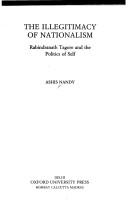Check nearby libraries
Buy this book

Nandy, Ashis. The Illegitimacy of Nationalism: Rabindranath Tagore and the Politics of Self. Delhi, Oxford University Press, 1994.
Summary: In this book, one of India’s (some might say, of the world’s) most eminent intellectuals sets out to examine the anti-nationalist thinking of a "dissenter among dissenters," the Nobel Prize-winning Bengali poet, novelist, and moral figure, whom Gandhi called gurudev, "great teacher": Rabindranath Tagore (b. 1861—d. 1941).
This double dissidence calls for elucidation. According to Nandy, in the golden age of the Indian freedom movement, many of the leading actors in that movement had become ambivalent about nationalism, associating it with the rapine and violence of colonialism. Most of these antinationalist freedom-activists believed that nationalism was a premodern artifact that would melt into air as soon as the principles of the Enlightenment were embraced. But a small band, Nandy contends, saw nationalism as being rather the inevitable by-product of modernity, and wanted nothing to do with the homogeneous universalism that was proffered as a solution to the problem. "Their alternative," he says, "was a distinctive civilizational concept of universalism embedded in the tolerance encoded in various traditional ways of life in a highly diverse, plural society" (xi). Nandy sees Rabindranath Tagore as being one of the proponents of this heterogeneous approach to modernity and the pathologies of nationalism.
The essay "explores, mainly through an analysis of the three explicitly political novels Tagore wrote, the political passions and philosophical awareness which pushed him towards a dissident concept of national ideology" (3). In Chapter One, "The Ideology," Nandy positions Tagore as the high-culture modernist (who was nonetheless a sharp critic of modernity) to Gandhi’s low-culture antimodernist (who nonetheless found much between the cracks of the modernity monolith that was worth celebrating). He then discusses the main thrust of Tagore’s 1917 book, Nationalism. In Chapter Two, "The Novels," Nandy reads Char Adhyay (Four Chapters), Ghare-Baire (The Home and the World), and the celebrated Gora, moving from the political-sociological concerns of the first, to the political-ethical concerns of the second, to the political-psychological concerns of the third. In Chapter Three, "The Lives," Nandy examines Tagore’s complex relationship with the Bengali revolutionary nationalist Brahmabandhab Upadhyay. The conclusion considers how Tagore could celebrate the mother-nation in his imaginative literature, and at the same time be a committed opponent of nationalism. [Tom Donahue]Nandy, Ashis. The Illegitimacy of Nationalism: Rabindranath Tagore and the Politics of Self. Delhi, Oxford University Press, 1994.
Summary: In this book, one of India’s (some might say, of the world’s) most eminent intellectuals sets out to examine the anti-nationalist thinking of a "dissenter among dissenters," the Nobel Prize-winning Bengali poet, novelist, and moral figure, whom Gandhi called gurudev, "great teacher": Rabindranath Tagore (b. 1861—d. 1941).
This double dissidence calls for elucidation. According to Nandy, in the golden age of the Indian freedom movement, many of the leading actors in that movement had become ambivalent about nationalism, associating it with the rapine and violence of colonialism. Most of these antinationalist freedom-activists believed that nationalism was a premodern artifact that would melt into air as soon as the principles of the Enlightenment were embraced. But a small band, Nandy contends, saw nationalism as being rather the inevitable by-product of modernity, and wanted nothing to do with the homogeneous universalism that was proffered as a solution to the problem. "Their alternative," he says, "was a distinctive civilizational concept of universalism embedded in the tolerance encoded in various traditional ways of life in a highly diverse, plural society" (xi). Nandy sees Rabindranath Tagore as being one of the proponents of this heterogeneous approach to modernity and the pathologies of nationalism.
The essay "explores, mainly through an analysis of the three explicitly political novels Tagore wrote, the political passions and philosophical awareness which pushed him towards a dissident concept of national ideology" (3). In Chapter One, "The Ideology," Nandy positions Tagore as the high-culture modernist (who was nonetheless a sharp critic of modernity) to Gandhi’s low-culture antimodernist (who nonetheless found much between the cracks of the modernity monolith that was worth celebrating). He then discusses the main thrust of Tagore’s 1917 book, Nationalism. In Chapter Two, "The Novels," Nandy reads Char Adhyay (Four Chapters), Ghare-Baire (The Home and the World), and the celebrated Gora, moving from the political-sociological concerns of the first, to the political-ethical concerns of the second, to the political-psychological concerns of the third. In Chapter Three, "The Lives," Nandy examines Tagore’s complex relationship with the Bengali revolutionary nationalist Brahmabandhab Upadhyay. The conclusion considers how Tagore could celebrate the mother-nation in his imaginative literature, and at the same time be a committed opponent of nationalism. [Tom Donahue]
Check nearby libraries
Buy this book

Previews available in: English
Showing 2 featured editions. View all 2 editions?
| Edition | Availability |
|---|---|
|
1
The illegitimacy of nationalism: Rabindranath Tagore and the politics of self
1994, Oxford University Press
in English
0195632982 9780195632989
|
zzzz
Libraries near you:
WorldCat
|
|
2
The illegitimacy of nationalism
1994, Oxford University Press, Oxford University Press, USA
in English
0195632982 9780195632989
|
aaaa
Libraries near you:
WorldCat
|
Book Details
Published in
Delhi, New York
Edition Notes
Includes index.
Classifications
The Physical Object
ID Numbers
Community Reviews (0)
Feedback?| July 31, 2020 | Edited by ImportBot | import existing book |
| April 28, 2010 | Edited by Open Library Bot | Linked existing covers to the work. |
| January 15, 2010 | Edited by WorkBot | add subjects and covers |
| December 9, 2009 | Created by WorkBot | add works page |










